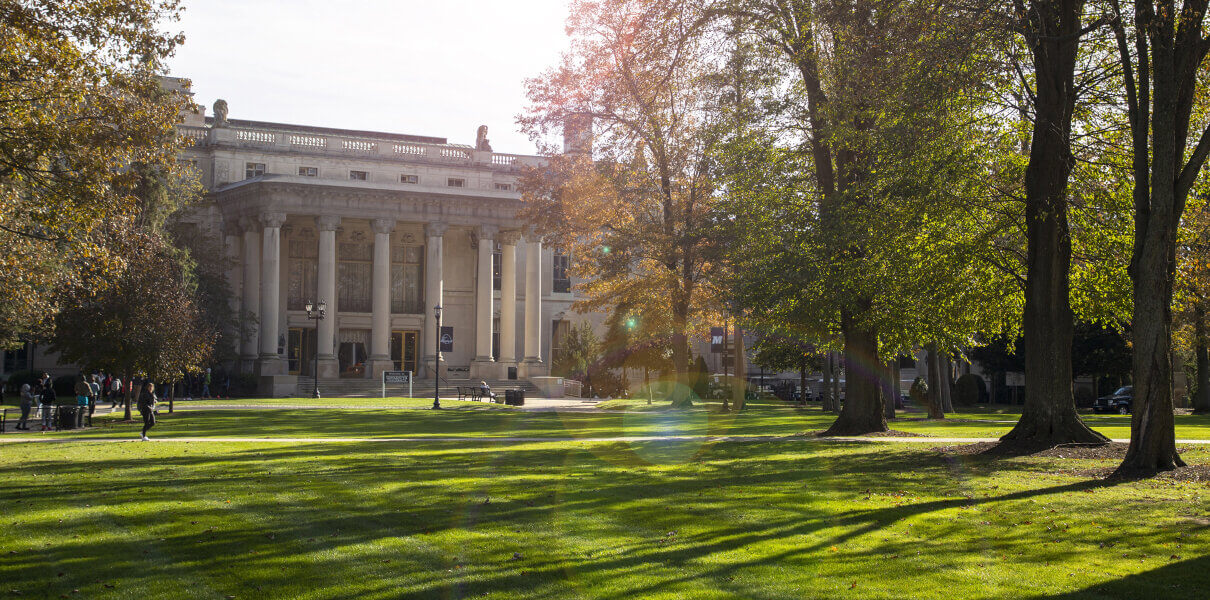More than 100 municipalities across the United States have implemented bans or limitations on the use of gas-powered leaf blowers, according to “The Problem with Gas-Powered Leaf Blowers” in “The Washington Post,” due to the health and environmental risks they pose. In New Jersey, most bans are seasonal, with a few towns having banned these types of leaf blowers year-round as stated in “New Jersey Monthly’s” article “The War on Gas-Powered Leaf Blowers Is Revving Up Across New Jersey.” On Monmouth University’s campus, however, gas-powered leaf blowers are a common sight.
Arguably, gas-powered leaf blowers are less noticeable by their literal fuel intake and more noticeable by their detrimental output. One unmistakable sign of a nearby gas leaf blower is its noise level. These types of leaf blowers operate at an average sound level of 80 decibels and above—ten decibels over what is considered to be safe hearing levels according to “What Are Decibels and How Can They Affect Hearing Health?” published by the National Council on Aging. QuietCleanPDX.org’s factsheet on gas-powered leaf blowers additionally cites these tools as creating low-frequency noises that can penetrate walls and buildings, thus invisibly increasing stress levels. Furthermore, the same factsheet states that continuous noise exposure can cause hypertension, high cholesterol, and increase one’s risk of atrial fibrillation.
Corey Dzenko, Ph.D., Associate Professor of Art & Design, experienced the noise effects of these leaf blowers and often has to adjust in order to accommodate for the noise. She explained, “I teach on the first floor of one of our academic buildings. The gas-powered blowers and mowers are so, so loud that often I have to stop teaching and wait for them to pass. Or, I have to close my office window when I’m in meetings. This happens regularly, especially in the Spring and Fall months.”
Some students, particularly those who live on campus, also can detect the presence of a leaf blower without having to see one. A senior communication student, who wishes to remain anonymous, credited leaf blowers outside of the dormitories as serving as a makeshift alarm clock. “I lived in the dorms last year, and I can remember on more than one occasion being woken up at around eight-thirty in the morning on some weekdays to the deafening sound of leaf blowers,” they said. “I was on the third floor, too, so I cannot imagine how obnoxious it must have been for those students living on the floors below me. If I wanted to be up that early on the days I didn’t have morning classes, I would have set my alarm.”
Perhaps the next well-noticed sign of a gas-powered leaf blower is its smell. “Lawn Care Goes Electric,” compiled by the Environment America Research & Policy Center and U.S. PIRG Education Fund, describes how two-stroke engines—which run on a mixture of oil and gas—release several deadly pollutants including, but not limited to, benzene, carbon dioxide, formaldehyde, and methane. Workers, as well as those within the near vicinity of these blowers, inhale these pollutants—and sometimes for extended periods of time.
Catherine Duckett, Ph.D., is the Associate Dean of the School of Science as well as an organizer for Monmouth’s Climate Crisis Teach-Ins. She explained, “Running a two-stroke engine for thirty minutes is equivalent to driving a Ford F-150 from here to Texas and back. It’s insane emissions, it’s insane small carbon particles, it’s insane damage to the environment.”
Sarah Henry, a sophomore biology MCP student, underwent her own instance of inhaling fumes exhumed by the gas-powered tools utilized on campus. “Last year in the fall semester, I was in class in Howard Hall, in the hallway adjacent to Pollak Theatre where the art gallery is located. About halfway through the class, a sudden and stark gas smell permeated the room,” she recounted. “As it became more intense, my professor even ended class for the day due to concerns over a gas leak or similar issue, and I, along with some of my classmates, left mildly lightheaded. Thankfully, class was dismissed before further inhalation, but the next class our professor informed us that a worker using a gas-powered tool had utilized it too close to an external vent, causing it to waft into our classroom.”
“I do think inhalation of gas fumes could pose a mild health risk,” Henry continued, “if not to the workers exposed every day for potentially hours at a time, but also to students passing by. Perhaps a few instances of inhalation are inconsequential, but what could be said about the effects over long periods and consistent exposure?”
The Health Center did not respond to our repeated requests for comment.
While it may be simple for one to realize the effects of gas-powered leaf blowers on themselves, it may be more indiscernible to realize the effects on an even smaller population: insects.
“Leaf blowers are basically bazookas for bugs,” Duckett started. “They pop them full of sand and dust particles. So any insect or insect chrysalis, cocoon, or egg that’s in the way of a leaf blower is full of holes. Any time you use a leaf blower, you’re killing bugs indiscriminately. That, in addition to the nasty noise pollution and the respiratory problems that leaf blowers can cause because of fine particles, carbon monoxide, and carbon dioxide, they’re a disaster from a public health perspective.”
She proceeded to describe that landscaping practices are a culprit in the detriment of insect food chains, especially concerning the environmental disruption that gas-powered leaf blowers impose. “Right now, there is a serious problem with insects,” she said. “The food chains are collapsing, and they’re collapsing partially because of our landscaping practices. Gas-powered leaf blowers are a part of it; leaf blowers and the need to clean up the leaves. [Leaves] shouldn’t be cleaned up, they should be left under trees, maybe in orderly little pens, but there should be a way to leave those nutrients to recycle and to allow insects a place to pupate.” She suggested that electric leaf blowers, though still capable of impacting the environment negatively, do so in a less-saturated manner. “[Electric leaf blowers] don’t kill as many bugs and they don’t have the auditory assaults, so they’re better for wildlife. And because they’re not as powerful, they don’t kill over quite as broad an area… they don’t have quite the power, [so] are going to kill slightly fewer insects. They’re also going to kill many fewer people.”
Will Heyniger, Lecturer of the Department of Environmental and Sustainability Sciences at Kean University, commented on the use of gas-powered leaf blowers and their impact on the environment.“Two main categories that people have issues with leaf blowers: noise and quality of life, and the other being air pollution. Those are the two main stances that people are not fans of with backpack leaf blowers.”
Heyniger continued, “We’re trying to impose a certain status on an ecosystem that doesn’t want to be that status. We’re holding it in stasis as a lawn. It doesn’t want to be a lawn, it wants to be a coastal forest, essentially. Until people change their mind about their lawn, this is going to be a problem. People want to blow their leaves and get rid of them, but I wonder if there’s a time where it’s okay that you left your leaves on the lawn and no one cared.”
Due to the powerful gusts emitted by gas-powered leaf blowers, they’re favored by many landscapers due to their effectiveness at maintaining large areas of lawn. Patrick Leahy, Ed.D., President of Monmouth University, credited this as one of the reasons the University employs the use of these blowers. “Gas-powered blowers have a higher power output, which is more effective for managing large outdoor spaces, especially for quickly clearing debris and potential tripping hazards,” he said. “Gas-powered blowers also outperform electric blowers in durability and longevity, which translates to lower maintenance costs and longer service life, making them more cost-effective over time.”
Leahy also credited the gas-powered leaf blowers as having a greater mobility and range of operation for these large areas, and they could do so without the need to stop and recharge. “We have tried electric leaf blowers in the past,” he explained, “but they were neither practical to meet the demands of our space, nor efficient in supporting the needs of our first-rate facilities management staff. A large college campus has different maintenance requirements than those of an average homeowner.” Despite this, however, Leahy also mentioned that the University does have seven battery-powered leaf blowers that are used to maintain smaller areas on campus. The chain saws, trimmers, and string trimmers on campus are also battery-powered. “Technology continues to evolve rapidly so we hope that the near future will offer more options to keep our campus safe, clear, and in good order,” he said.
Facilities Management additionally did not respond to our repeated requests for comment.
According to Monmouth’s website, “Monmouth University is committed to pursuing green initiatives on campus.” Some members of the University community, however, believe that the use of gas-powered leaf blowers is at odds with this statement.
Laura Turner, Ph.D., Associate Professor of Mathematics, said, “Before suggesting we turn to electric leaf blowers, I would encourage those who make these decisions to reflect upon the University’s commitment to being a green campus and urge them to put their money where their mouth is.”
Dzenko shared a similar sentiment: “When I started teaching at Monmouth, I remember the University celebrating being a ‘green campus.’ The use of gas-powered blowers is not ‘green.’”
Nevertheless, Monmouth is in fact recognized as being a green campus in the United States by the United States Environmental Protection Agency as well as Princeton Review’s 2024 “Guide to Green Colleges.” Leahy explained, “It’s fair to say that sustainability is important to everyone at Monmouth. Our students are active in beach clean-ups and sustainability efforts, our faculty are passionate about the effects of climate change, and my administrative team is always evaluating greener alternatives to our ongoing practices, especially related to the stewardship and care of our beautiful campus.”
The solution favored by staff and students for a greener campus? A less “pretty” one.
“In terms of preserving the environment, not moving the leaves around and leaving them where they are is important,” Duckett suggested. “How to promote a healthy ecosystem and resilience in animal food webs would be to create an area under big trees where you could pile up the leaves and use them like mulch. You would just leave those areas maybe with little tiny decorative order to keep the leaves, and that would provide a place for insects to drop out of the tree and pupate so they wouldn’t get killed on impact by dropping onto hard ground.”
John Morano, Environmental Author and Professor of Journalism, concurred with the idea that leaving the leaves be could possibly serve as a beneficial solution. “While it’s wonderful to consider how we might remove leaves responsibly, and we should absolutely consider that, perhaps,” he said, “we should be wondering whether the leaves should be removed at all. Most of the research suggests that modest leaf cover is a natural mulch, maintains soil hydration, protects roots, and supports a myriad of life just beneath the surface of the soil, among other benefits. Leaves really aren’t debris; they are generally a vital component of the ecosystem.”
Turner proposed that there are ways to keep the lawns on campus manicured while simultaneously promoting better ecosystem practices. “I don’t think we should be viewing and treating our campus as a space that needs to be perfectly manicured, especially because the way our campus is manicured renders it essentially sterile,” she said. “We should replace some of the vast swaths of lawn with native plants and aim to increase biodiversity on campus. Douglas Tallamy, for example, who recently spoke at MU, recommends replacing some of the lawn under trees with beds appropriate to the area, pointing out that this creates important caterpillar pupation sites. All of this can be done in attractive ways, and all of this can be connected to valuable learning opportunities for students… I don’t think any of this would be unsightly. In fact, I believe our campus would be even more beautiful as a result.”
Dzenko agreed: “Campus is always talked about as being so beautiful, but it can help people understand that a pristine landscape is not beautiful in terms of conservation concerns and the climate crisis.”
Some students consent to this idea, arguing that the resources used for manicuring lawns could be better allocated elsewhere. Henry said, “The University puts a lot of emphasis on manicured lawns in regard to both gasoline-powered leaf blowers and lawnmowers. I hear a lot of students mention the casual use of resources on these, seen by many as ‘a waste’ of money that could be allocated towards other resources.”
Geiona Petronzio, a senior health studies major, shared, “I personally like the landscape; it gives a vibrant appearance of the school, but I would also prefer a way that the landscapers could use eco-friendly methods in order to still maintain the landscape while also achieving a more eco-friendly campus. This is especially true considering they do tend to work multiple times a week in every season to keep up with its appearance.”
Duckett explained that this sort of solution would also be feasible with the combined use of battery-powered leaf blowers; after all, there would be less area to cover. “If they’re switching to electric leaf blowers,” she said, “it’s a capital investment. They’re going to require more time to do the same job. They don’t need that time if they change their landscaping practice and establish larger areas under trees that have shrubs and perennial plants where the leaves can be piled up.”
She concluded, “We’re doing [the harm] to ourselves. The horrible thing is, we know what to do, but we’re not doing it.”




